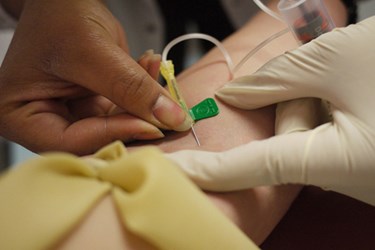Detecting Cancer With A Simple Blood Test
By Joel Lindsey

Researchers at the Stanford University School of Medicine have devised an effective way to detect the presence of solid cancers using a simple blood sample, according to a recently published report.
“We set out to develop a method that overcomes two major hurdles in the circulating tumor DNA field,” Maximilian Diehn, assistant professor of radiation oncology at Stanford and a member of the research team, said in a news release published on Stanford’s website. “First, the technique needs to be very sensitive to detect the very small amounts of tumor DNA present in the blood. Second, to be clinically useful it’s necessary to have a test that works off the shelf for the majority of patients with a given cancer.”
To accomplish these goals, Diehn and the rest of the research team devised a system they call Cancer Personalized Profiling by deep Sequencing (CAPP-Seq), which they claim is sensitive enough to detect even a single molecule of tumor DNA located within a much larger pool of 10,000 healthy DNA molecules.
Focusing initially on non-small-cell lung cancer, the research group began by using a bioinformatics approach — comparing information from The Cancer Genome Atlas with samples from 407 patients in order to identify genomes with cancer-associated mutations. Once they had identified the genes that were most commonly altered in non-small-cell lung cancer (139 in all), the researchers designed oligonucleotides — panels of short pieces of DNA — that bracketed off these particular genes. Finally, the oligonucleotides were used to perform “deep sequencing” of the surrounding DNA, according to the Stanford article.
“We looked for which genes are most commonly altered, and used computational approaches to identify what we call the genetic architecture of the cancer,” said Ash Alizadeh, an assistant professor of medicine at Stanford who is also involved in the project. “That allowed us to identify the part of the genome that would be best to identify and track the disease.”
By using the oligonucleotides to identify patient-specific mutations, the researchers could effectively monitor the disease by measuring the quantity of cancer DNA in the blood.
With the ability to identify a wide range of the most important and relevant cancer-related genetic mutations, CAPP-Seq may provide more accurate and trustworthy blood analyses than other blood testing techniques.
“A key advantage of our approach is that we can also track many different classes of mutations, and integrate information from all of them to get a much stronger signal,” said Aaron Newman, another member of the research team. “We’ve also developed statistical methods to suppress the background noise in a sample. This allows us to identify even very minute quantities of cancer DNA in a blood sample.”
The team has published the results of these early tests in an article in the journal Nature Medicine. Having focused their initial efforts on non-small-cell lung cancer, researchers now hope to apply the CAPP-Seq technique to other types of solid cancers.
Image Credit: “Poke.” Thirteen Of Clubs. © 2011 CC By-SA 2.0: https://creativecommons.org/licenses/by-sa/2.0/
